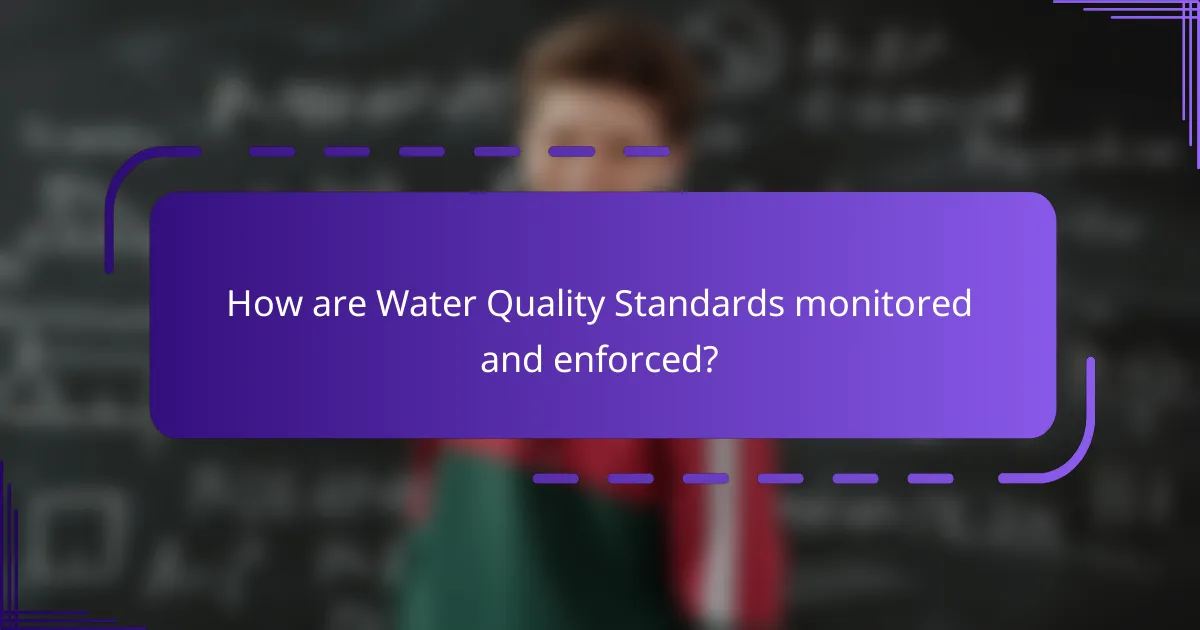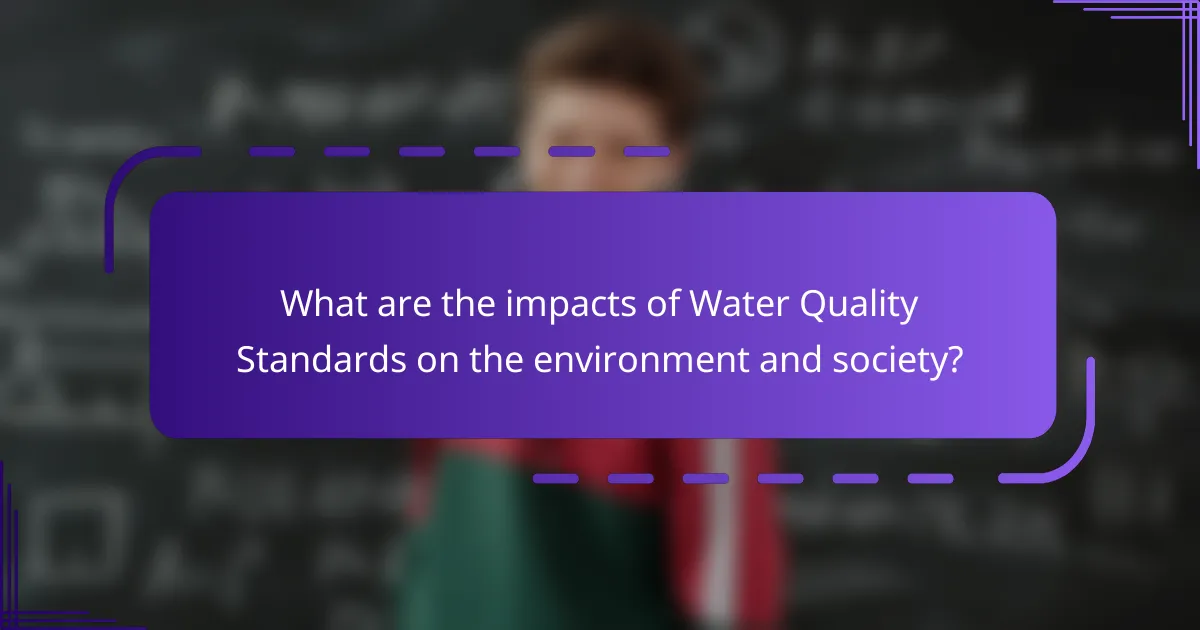Water Quality Standards in South Africa are regulatory benchmarks that set acceptable limits for various water quality parameters, ensuring the safety of water for human consumption, aquatic life, and recreational activities. Established by the South African National Water Act of 1998, these standards encompass physical, chemical, and biological indicators such as pH, dissolved oxygen, and turbidity. The Department of Water and Sanitation monitors compliance through regular assessments, with enforcement actions for violations aimed at protecting public health and the environment. These standards play a critical role in regulating pollutants, promoting sustainable water use, and supporting economic growth by attracting investments in clean technologies.

What are Water Quality Standards in South Africa?
Water Quality Standards in South Africa are regulations that define the acceptable limits for various water quality parameters. These standards ensure the safety and suitability of water for human consumption, aquatic life, and recreational use. The South African National Water Act of 1998 establishes these standards. They cover physical, chemical, and biological indicators of water quality. Key parameters include pH, dissolved oxygen, turbidity, and the presence of harmful substances. Compliance with these standards is monitored by the Department of Water and Sanitation. Violations can lead to penalties and remediation measures. These standards are crucial for protecting public health and the environment.
Why are Water Quality Standards important for public health?
Water Quality Standards are crucial for public health as they ensure safe drinking water. These standards regulate contaminants that can cause health risks. For instance, the World Health Organization states that poor water quality can lead to diseases such as cholera and dysentery. By setting limits on harmful substances, these standards protect communities from waterborne illnesses. In South Africa, compliance with these standards is vital for preventing health crises. Studies show that proper water quality management can significantly reduce disease incidence. Thus, Water Quality Standards play a key role in safeguarding public health.
How do Water Quality Standards protect human health?
Water Quality Standards protect human health by establishing acceptable limits for contaminants in drinking water. These standards are based on scientific research that identifies harmful substances and their effects on health. For example, the presence of pathogens can lead to waterborne diseases. Standards regulate levels of bacteria, viruses, and chemicals to prevent these health risks. By monitoring water quality, authorities can ensure safe drinking water. Compliance with these standards reduces the incidence of health issues related to contaminated water. Overall, Water Quality Standards serve as a critical framework for safeguarding public health.
What are the consequences of poor water quality on health?
Poor water quality can lead to serious health consequences. Contaminated water can cause waterborne diseases such as cholera and dysentery. These diseases result from pathogens like bacteria and viruses present in unsafe water. According to the World Health Organization, over 2 billion people lack access to safe drinking water, increasing disease risk. Long-term exposure to contaminated water can lead to chronic health issues, including kidney damage and cancer. Heavy metals in water, such as lead and arsenic, are particularly harmful. They can cause neurological disorders and developmental issues in children. Poor water quality also affects mental health, increasing stress and anxiety levels in affected communities.
What are the key parameters of Water Quality Standards?
Key parameters of Water Quality Standards include physical, chemical, and biological criteria. Physical parameters assess temperature, turbidity, and color. Chemical parameters evaluate pH, dissolved oxygen, and nutrient levels like nitrogen and phosphorus. Biological parameters focus on the presence of pathogens and indicators like coliform bacteria. These standards ensure safe water for human consumption and ecosystem health. Regulatory bodies, such as the South African Department of Water and Sanitation, set these standards to protect public health and the environment. Compliance with these parameters is crucial for sustainable water management.
What physical, chemical, and biological parameters are measured?
Physical parameters measured include temperature, turbidity, and color. Chemical parameters encompass pH, dissolved oxygen, nitrates, and phosphates. Biological parameters involve the presence of coliform bacteria and other microorganisms. These measurements are crucial for assessing water quality. They help determine the suitability of water for various uses. Accurate monitoring ensures compliance with South African water quality standards. Regular assessments protect public health and the environment.
How do these parameters influence water quality assessments?
Parameters significantly influence water quality assessments by providing measurable indicators of water’s physical, chemical, and biological characteristics. These assessments rely on parameters such as pH, dissolved oxygen, turbidity, and nutrient levels. Each parameter affects the overall health of aquatic ecosystems. For instance, pH levels can indicate acidity or alkalinity, impacting aquatic life survival. Dissolved oxygen levels are crucial for fish and other organisms’ respiration. High turbidity can hinder photosynthesis in aquatic plants, affecting food chains. Nutrient levels, particularly nitrogen and phosphorus, can lead to algal blooms, disrupting ecosystems. Accurate measurement of these parameters ensures compliance with water quality standards, essential for public health and environmental protection.
What regulations govern Water Quality Standards in South Africa?
The regulations governing Water Quality Standards in South Africa are primarily outlined in the National Water Act of 1998. This act establishes the framework for water resource management and quality standards. The Department of Water and Sanitation is responsible for implementing these regulations. Specific water quality guidelines are detailed in the South African Water Quality Guidelines series. These guidelines address various water uses, including drinking, recreational, and agricultural purposes. Compliance with these standards is essential for protecting public health and the environment. Regular monitoring and assessment are mandated to ensure adherence to these regulations.
What are the main legislative frameworks for water quality?
The main legislative frameworks for water quality in South Africa include the National Water Act of 1998 and the Water Services Act of 1997. The National Water Act establishes the legal framework for water resource management. It promotes sustainable use and protection of water resources. The Water Services Act focuses on the provision of water services and ensures access to safe drinking water. Additionally, the National Environmental Management Act provides guidelines for environmental protection, which includes water quality standards. These frameworks collectively aim to maintain and improve water quality across the country.
How do these regulations ensure compliance and enforcement?
These regulations ensure compliance and enforcement through systematic monitoring and reporting mechanisms. Regulatory bodies conduct regular assessments of water quality against established standards. They utilize sampling and testing methods to evaluate compliance with these standards. Violations can result in penalties, including fines or operational restrictions. Public reporting of water quality data increases transparency and accountability. Stakeholders are encouraged to report violations, enhancing community involvement. Enforcement actions are guided by legal frameworks that define responsibilities and procedures. This structured approach fosters adherence to water quality standards.

How are Water Quality Standards monitored and enforced?
Water Quality Standards are monitored and enforced through various regulatory frameworks and agencies. In South Africa, the Department of Water and Sanitation (DWS) oversees the implementation of these standards. Regular water quality assessments are conducted to ensure compliance with established guidelines. Monitoring involves sampling water from various sources, including rivers, lakes, and treatment plants. Laboratory analyses determine the presence of pollutants and their concentrations. Enforcement actions may include penalties for non-compliance, remediation orders, or legal proceedings against violators. The National Water Act of 1998 provides the legal foundation for these activities, ensuring the protection of water resources.
What agencies are responsible for monitoring water quality?
The agencies responsible for monitoring water quality in South Africa include the Department of Water and Sanitation (DWS) and the South African National Biodiversity Institute (SANBI). The DWS oversees national water resources and enforces water quality regulations. SANBI focuses on the conservation of biodiversity and monitors aquatic ecosystems. Additionally, provincial environmental departments also play a role in local water quality assessments. These agencies collaborate to ensure compliance with water quality standards set by the National Water Act.
How do these agencies conduct water quality assessments?
Agencies conduct water quality assessments by collecting water samples from various sources. They analyze these samples for physical, chemical, and biological parameters. Common parameters include pH, dissolved oxygen, nutrients, and contaminants. Agencies often use standardized methods for sampling and testing. These methods ensure consistency and reliability in results. Laboratory analysis follows the field sampling to determine water quality. Results are compared against established water quality standards. This process helps identify pollution sources and assess ecosystem health.
What role do local communities play in monitoring water quality?
Local communities play a crucial role in monitoring water quality by engaging in data collection and reporting. They often conduct water testing to identify contaminants and assess safety. Community members can raise awareness about pollution sources and advocate for better practices. Local knowledge helps identify changes in water conditions over time. In South Africa, initiatives like the Community Water Monitoring Program empower residents to participate actively. This involvement enhances transparency and accountability in water management. Studies show that community-led monitoring can effectively complement governmental efforts. Engaging locals fosters a sense of ownership and responsibility towards water resources.
What challenges exist in enforcing Water Quality Standards?
Enforcing Water Quality Standards faces several challenges. One significant challenge is the lack of resources for monitoring and enforcement. Many regulatory agencies operate with limited budgets and personnel. This restricts their ability to conduct regular water quality assessments.
Another challenge is the complexity of water quality data. Understanding and interpreting data from various sources can be difficult. Additionally, pollution sources can be diffuse and hard to trace. This complicates accountability for violations of water quality standards.
Public awareness and education about water quality issues are also lacking. Many communities may not understand the importance of these standards. This can lead to insufficient public support for enforcement efforts.
Finally, regulatory frameworks may be outdated or inconsistent. Changes in environmental conditions and technology require adaptive management strategies. Without updating regulations, enforcement can become ineffective.
How do resource limitations impact enforcement efforts?
Resource limitations significantly hinder enforcement efforts in water quality standards. Insufficient funding leads to inadequate staffing and equipment. This reduces the frequency and effectiveness of monitoring activities. Limited resources also restrict training opportunities for enforcement personnel. Consequently, enforcement agencies struggle to respond to violations promptly. A study by the South African Department of Water and Sanitation indicated that budget cuts resulted in a 30% decrease in compliance inspections. These limitations ultimately compromise public health and environmental protection.
What are the common violations of water quality standards?
Common violations of water quality standards include excessive levels of pollutants. These pollutants can be heavy metals, such as lead and mercury. High concentrations of nutrients, like nitrogen and phosphorus, are also common violations. Bacteria, particularly E. coli, often exceed safe limits in water bodies. Additionally, elevated levels of suspended solids can violate standards. Chemical contaminants, such as pesticides and industrial chemicals, frequently breach acceptable levels. Violations can lead to significant health risks and environmental damage. Monitoring and enforcement are crucial for maintaining water quality.

What are the impacts of Water Quality Standards on the environment and society?
Water Quality Standards significantly impact both the environment and society. These standards regulate pollutants in water bodies, ensuring safe drinking water and protecting aquatic ecosystems. Improved water quality leads to healthier habitats for wildlife, reducing biodiversity loss. They also prevent waterborne diseases, enhancing public health. Compliance with these standards promotes sustainable water use, benefiting agriculture and industry. Furthermore, stricter regulations can lead to economic growth by attracting investments in clean technologies. In South Africa, adherence to the National Water Act supports the conservation of water resources, crucial for a water-scarce country.
How do Water Quality Standards affect ecosystems?
Water Quality Standards significantly impact ecosystems by ensuring the health of aquatic environments. These standards regulate pollutants, temperature, and nutrient levels in water bodies. By maintaining acceptable levels of contaminants, they protect aquatic life from harmful substances. Healthy water quality supports biodiversity, including fish, plants, and microorganisms. Poor water quality can lead to habitat degradation and loss of species. For instance, excessive nutrients can cause algal blooms, which deplete oxygen and harm aquatic organisms. The implementation of these standards helps preserve ecosystem functions and services, such as water filtration and carbon cycling.
What are the implications for aquatic life and biodiversity?
Aquatic life and biodiversity are significantly impacted by water quality standards. Poor water quality can lead to habitat degradation, which negatively affects fish and plant populations. Contaminants such as heavy metals and nutrients can cause algal blooms, depleting oxygen levels. This results in hypoxia, which can suffocate aquatic organisms. Additionally, changes in pH levels can harm sensitive species, disrupting the ecosystem balance. Research indicates that biodiversity loss in aquatic habitats can reduce resilience to environmental changes. Therefore, maintaining stringent water quality standards is essential for protecting aquatic life and promoting biodiversity in South Africa.
How do water quality impacts extend to terrestrial environments?
Water quality impacts extend to terrestrial environments through the contamination of soil and vegetation. Pollutants from water bodies can leach into the ground, affecting soil health. This can lead to reduced agricultural productivity. Contaminated water can also affect the uptake of nutrients by plants. Toxic substances may accumulate in crops, posing risks to food safety. Additionally, altered water quality can disrupt local ecosystems. Aquatic organisms may transfer pollutants to terrestrial predators. This interconnectedness highlights the importance of maintaining water quality for overall environmental health.
What socio-economic benefits arise from adhering to Water Quality Standards?
Adhering to Water Quality Standards provides significant socio-economic benefits. These benefits include improved public health, as clean water reduces the incidence of waterborne diseases. Enhanced water quality supports agriculture, leading to increased crop yields and food security. It also boosts tourism by maintaining the attractiveness of natural water bodies. Adherence to these standards can stimulate economic growth through job creation in water management sectors. Moreover, compliance can lead to lower healthcare costs associated with treating water-related illnesses. Studies indicate that every dollar invested in water quality can yield a return of up to four dollars in economic benefits. Therefore, maintaining high water quality standards is crucial for both societal well-being and economic development.
How does clean water contribute to economic development?
Clean water significantly contributes to economic development by improving public health, enhancing productivity, and facilitating industry growth. Access to clean water reduces the incidence of waterborne diseases. This leads to lower healthcare costs and increased workforce participation. Healthy individuals are more productive, which boosts economic output. Clean water also supports agriculture by improving crop yields. Higher agricultural productivity can lead to increased food security and income for farmers. Additionally, industries rely on clean water for manufacturing processes. This can attract investment and create jobs. According to the World Health Organization, every $1 invested in clean water yields an economic return of $4.
What are the benefits for agriculture and tourism sectors?
Agriculture and tourism sectors benefit significantly from high water quality standards. Clean water enhances crop yields in agriculture. It reduces the risk of waterborne diseases affecting livestock. High-quality water also supports sustainable farming practices. In tourism, pristine water bodies attract visitors. They contribute to recreational activities like fishing and swimming. Clean water improves the overall experience for tourists. Both sectors rely on water for their operations. Maintaining water quality is essential for economic growth in these industries.
What practical steps can individuals take to support water quality initiatives?
Individuals can support water quality initiatives by reducing pollution. They can avoid using harmful chemicals in gardens and yards. This prevents runoff that contaminates water sources. Individuals should also participate in local clean-up events. Removing litter from rivers and lakes improves water quality. Using environmentally friendly products helps minimize pollution. Properly disposing of waste, especially hazardous materials, is crucial. Individuals can also advocate for policy changes that protect water resources. Supporting organizations focused on water conservation amplifies their impact.
Water Quality Standards in South Africa are essential regulations that define acceptable limits for various water quality parameters to ensure safe drinking water and protect public health and aquatic ecosystems. The article covers the key physical, chemical, and biological parameters that are monitored, the regulations established under the National Water Act of 1998, and the role of agencies like the Department of Water and Sanitation in enforcing compliance. It also discusses the socio-economic benefits of adhering to these standards, the impacts on human health and the environment, and practical steps individuals can take to support water quality initiatives. Overall, the article provides a comprehensive overview of the importance, monitoring, and implications of water quality standards in South Africa.